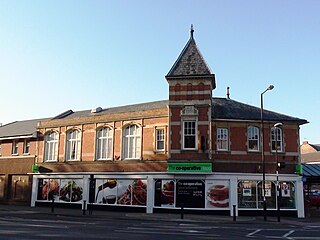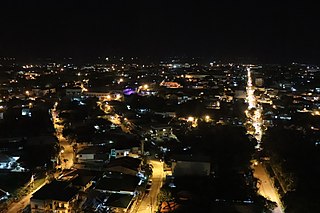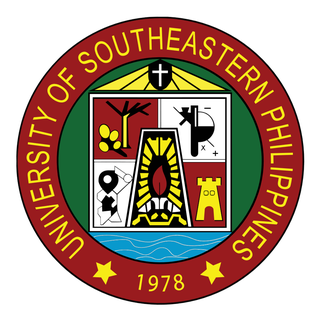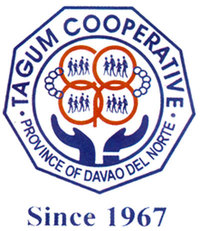
A cooperative is "an autonomous association of persons united voluntarily to meet their common economic, social and cultural needs and aspirations through a jointly owned and democratically-controlled enterprise". Cooperatives are democratically controlled by their members, with each member having one vote in electing the board of directors. They differ from collectives in that they are generally built from the bottom-up, rather than the top-down. Cooperatives may include:

Davao Region, formerly called Southern Mindanao, is an administrative region in the Philippines, designated as Region XI. It is situated at the southeastern portion of Mindanao and comprises five provinces: Davao de Oro, Davao del Norte, Davao del Sur, Davao Oriental, and Davao Occidental.

Davao City, officially the City of Davao, is a highly urbanized city in the Davao Region, Philippines. The city has a total land area of 2,443.61 km2 (943.48 sq mi), making it the largest city in the Philippines in terms of land area. It is the third-most populous city in the Philippines after Quezon City and Manila respectively, and the most populous city in Mindanao, in Davao Region, and outside of Metro Manila. According to the 2020 census, it has a population of 1,776,949 people.

Panabo, officially the City of Panabo, is a 3rd class component city in the province of Davao del Norte, Philippines. According to the 2020 census, it has a population of 209,230 people.

Tagum, officially the City of Tagum, is a 1st class component city and capital of the Davao del Norte, Philippines. According to the 2020 census, it has a population of 296,202 people making it the most populous component city in Mindanao and in Davao del Norte, as well as the second most populous in Davao Region after Davao City.
The United Kingdom is home to a widespread and diverse co-operative movement, with over 7,000 registered co-operatives owned by 17 million individual members and which contribute £34bn a year to the British economy. Modern co-operation started with the Rochdale Pioneers' shop in the northern English town of Rochdale in 1844, though the history of co-operation in Britain can be traced back to before 1800. The British co-operative movement is most commonly associated with The Co-operative brand which has been adopted by several large consumers' co-operative societies; however, there are many thousands of registered co-operative businesses operating in the UK. Alongside these consumers' co-operatives, there exist many prominent agricultural co-operatives (621), co-operative housing providers (619), health and social care cooperatives (111), cooperative schools (834), retail co-operatives, co-operatively run community energy projects, football supporters' trusts, credit unions, and worker-owned businesses.

A consumers' co-operative is an enterprise owned by consumers and managed democratically and that aims at fulfilling the needs and aspirations of its members. Such co-operatives operate within the market system, independently of the state, as a form of mutual aid, oriented toward service rather than pecuniary profit. Many cooperatives, however, do have a degree of profit orientation. Just like other corporations, some cooperatives issue dividends to owners based on a share of total net profit or earnings ; or based on a percentage of the total amount of purchases made by the owner. Regardless of whether they issue a dividend or not, most consumers’ cooperatives will offer owners discounts and preferential access to goods and services.

Philippine Rice Research Institute (PhilRice) is a government corporate entity attached to the Department of Agriculture created through Executive Order 1061 on November 5, 1985 to help develop high-yielding and cost-reducing technologies for farmers.
The history of the cooperative movement concerns the origins and history of cooperatives across the world. Although cooperative arrangements, such as mutual insurance, and principles of cooperation existed long before, the cooperative movement began with the application of cooperative principles to business organization.
A student housing cooperative, also known as co-operative housing, is a housing cooperative for student members. Members live in alternative cooperative housing that they personally own and maintain. These houses are designed to lower housing costs while providing an educational and community environment for students to live and grow in. They are, in general, nonprofit, communal, and self-governing, with students pooling their monetary and personal resources to create a community style home. Many student housing cooperatives share operation and governing of the house. As with most cooperatives, student housing coops follow the Rochdale Principles and promote collaboration and community work done by the members for mutual benefit.

The Cooperative NATCCO Party (Coop-NATCCO) is a party-list in the Philippines which serves as the electoral wing of the National Confederation of Cooperatives (NATCCO). Coop-NATCCO has represented the Philippine co-operative sector in the Philippine 11th Congress since 1998 when the party won a seat in the House of Representatives in the first ever national party-list election held in the country that year. Coop-NATCCO has continued to win a seat in Congress in the succeeding party-list elections.

Metro Davao, officially Metropolitan Davao, is a metropolitan area in Mindanao, Philippines. It includes the cities of Davao, Digos, Mati, Panabo, Samal and Tagum and spanned parts of all five provinces of the Davao Region. Metro Davao is one of three metropolitan areas in the Philippines. It is administered by the Metropolitan Davao Development Authority. It is the largest metropolitan region by land area and the second most populous in the Philippines.

The University of Southeastern Philippines is a public, research, coeducational, regional state university based in Davao City, Davao del Sur, Philippines. Founded on December 15, 1978, the university is an integration of four state educational institutions: Mindanao State University-Davao, the University of the Philippines-Master of Management Program in Davao, the Davao School of Arts and Trades, and the Davao National Regional Agricultural School. It was the first state university in Davao Region.
The National Confederation of Cooperatives (NATCCO) is the largest cooperative federation in the Philippines with 760 member cooperatives and Non-governmental Organizations NGO in 77 Provinces and 130 Cities and Municipalities as of June 2015.

The Mindanao Railway, previously known as the Trans-Mindanao High Speed Railway, is a proposed railway system in Mindanao, the southernmost major island of the Philippines. Originally proposed in 1936 as part of Manuel L. Quezon's efforts to strengthen the presence of Commonwealth government in Mindanao against the rising influence of Imperial Japan before World War II, the line was shelved. Other proposals and studies were made in the 1950s, 1990s, and the 2000s, but never materialized. The current line began development in 2018; however, construction has yet to start. It will be initially built as a single-track standard gauge system to be operated by diesel-powered rolling stock, but will have provisions for upgrading to double-track and electrification through overhead lines.
Jose Ragandap Ping-ay was a Filipino politician who was Congressman in the 14th and 15th Congress as Partylist Representative of Coop-NATCCO. He served as Vice Mayor of his hometown Santa Cruz and was a Sangguniang Panlalawigan Member of the province of Ilocos Sur.
Leopoldo "Bong" Jumalon Vega is a Filipino physician, surgeon and former hospital administrator serving as an undersecretary of the Department of Health since 2020. Prior to joining the administration of President Rodrigo Duterte, he served as medical center chief of the state-run Southern Philippines Medical Center in Davao City for twelve years. On July 13, 2020, Vega was appointed to the National Task Force Against Coronavirus under the Inter-Agency Task Force for the Management of Emerging Infectious Diseases as COVID-19 Treatment Czar.










